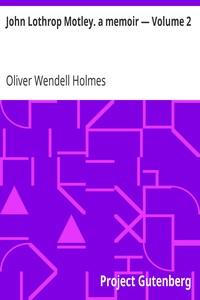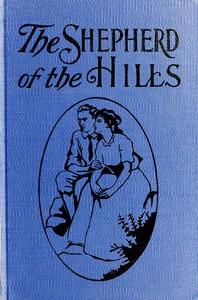|
|
Read this ebook for free! No credit card needed, absolutely nothing to pay.Words: 26754 in 7 pages
This is an ebook sharing website. You can read the uploaded ebooks for free here. No credit cards needed, nothing to pay. If you want to own a digital copy of the ebook, or want to read offline with your favorite ebook-reader, then you can choose to buy and download the ebook.

: John Lothrop Motley. a memoir — Volume 2 by Holmes Oliver Wendell - Motley John Lothrop 1814-1877@FreeBooksTue 06 Jun, 2023 We encourage you to keep this file, exactly as it is, on your own disk, thereby keeping an electronic path open for future readers. Please do not remove this. Edition: 10 The "legal small print" and other information about this book may now be found at the end of this file. Please read this important information, as it gives you specific rights and tells you about restrictions in how the file may be used. JOHN LOTHROP MOTLEY. A MEMOIR RESIDENCE IN ENGLAND.--OUTBREAK OF THE CIVIL WAR.--LETTERS TO THE LONDON "TIMES."--VISIT TO AMERICA.--APPOINTED MINISTER TO AUSTRIA.--LADY HARCOURT'S LETTER.--MISS MOTLEY'S MEMORANDUM. The winter of 1859-60 was passed chiefly at Oatlands Hotel, Walton-on- Thames. In 1860 Mr. Motley hired the house No. 31 Hertford Street, May Fair, London. He had just published the first two volumes of his "History of the Netherlands," and was ready for the further labors of its continuation, when the threats, followed by the outbreak, of the great civil contention in his native land brought him back from the struggles of the sixteenth and seventeenth centuries to the conflict of the nineteenth. His love of country, which had grown upon him so remarkably of late years, would not suffer him to be silent at such a moment. All around him he found ignorance and prejudice. The quarrel was like to be prejudged in default of a champion of the cause which to him was that of Liberty and Justice. He wrote two long letters to the London "Times," in which he attempted to make clear to Englishmen and to Europe the nature and conditions of our complex system of government, the real cause of the strife, and the mighty issues at stake. Nothing could have been more timely, nothing more needed. Mr. William Everett, who was then in England, bears strong testimony to the effect these letters produced. Had Mr. Motley done no other service to his country, this alone would entitle him to honorable remembrance as among the first defenders of the flag, which at that moment had more to fear from what was going on in the cabinet councils of Europe than from all the armed hosts that were gathering against it. He returned to America in 1861, and soon afterwards was appointed by Mr. Lincoln Minister to Austria. Mr. Burlingame had been previously appointed to the office, but having been objected to by the Austrian Government for political reasons, the place unexpectedly left vacant was conferred upon Motley, who had no expectation of any diplomatic appointment when he left Europe. For some interesting particulars relating to his residence in Vienna I must refer to the communications addressed to me by his daughter, Lady Harcourt, and her youngest sister, and the letters I received from him while at the Austrian capital. Lady Harcourt writes:-- Miss Motley, the historian's youngest daughter, has added a note to her sister's communication:-- "During his residence in Vienna the most important negotiations which he had to carry on with the Austrian Government were those connected with the Mexican affair. Maximilian at one time applied to his brother the Emperor for assistance, and he promised to accede to his demand. Accordingly a large number of volunteers were equipped and had actually embarked at Trieste, when a dispatch from Seward arrived, instructing the American Minister to give notice to the Austrian Government that if the troops sailed for Mexico he was to leave Vienna at once. My father had to go at once to Count Mensdorff with these instructions, and in spite of the Foreign Minister being annoyed that the United States Government had not sooner intimated that this extreme course would be taken, the interview was quite amicable and the troops were not allowed to sail. We were in Vienna during the war in which Denmark fought alone against Austria and Prussia, and when it was over Bismarck came to Vienna to settle the terms of peace with the Emperor. He dined with us twice during his short stay, and was most delightful and agreeable. When he and my father were together they seemed to live over the youthful days they had spent together as students, and many were the anecdotes of their boyish frolics which Bismarck related." Free books android app tbrJar TBR JAR Read Free books online gutenberg More posts by @FreeBooks
: Three Dialogues Between Hylas and Philonous in Opposition to Sceptics and Atheists by Berkeley George - Soul; Idealism Harvard Classics; Philosophy@FreeBooksTue 06 Jun, 2023

: A Treatise Concerning the Principles of Human Knowledge by Berkeley George - Soul; Knowledge Theory of; Idealism Philosophy@FreeBooksTue 06 Jun, 2023
|
Terms of Use Stock Market News! © gutenberg.org.in2025 All Rights reserved.






